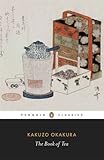The Book of Tea (Penguin Classics) Reviews
The Book of Tea (Penguin Classics)

Zen and the art of tea-the classic book about the Japanese tea ceremony that is as much a guide to life.
Ritualized, romantic, and historically rich, the tea ceremony is the creation of something beautiful out of the everyday. Originally written in English more than a hundred years ago to be read aloud at Isabella Stewart Gardner's famous salon, The Book of Tea presents the meeting of East and West in a teacup. It explores Asian culture through the history and aestheticism-or "teaism"-of the tea ceremony and also suggests a deep connection between beauty and war, and between flowers and social mores. In its formality, attention to detail, and celebration of beauty and harmony, the tea ceremony encapsulates the Japanese view of life-in fact, the art of life.That a nation should construct one of its most resonant national ceremonies round a cup of tea will surely strike a chord of sympathy with at least some readers of this review. To many foreigners, nothing is so quintessentially Japanese as the tea ceremony--more properly, "the way of tea"--with its austerity, its extravagantly minimalist stylization, and its concentration of extreme subtleties of meaning into the simplest of actions. The Book of Tea is something of a curiosity: written in English by a Japanese scholar (and issued here in bilingual form), it was first published in 1906, in the wake of the naval victory over Russia with which Japan asserted its rapidly acquired status as a world-class military power. It was a peak moment of Westernization within Japan. Clearly, behind the publication was an agenda, or at least a mission to explain. Around its account of the ceremony, The Book of Tea folds an explication of the philosophy, first Taoist, later Zen Buddhist, that informs its oblique celebration of simplicity and directness--what Okakura calls, in a telling phrase, "moral geometry." And the ceremony itself? Its greatest practitioners have always been philosophers, but also artists, connoisseurs, collectors, gardeners, calligraphers, gourmets, flower arrangers. The greatest of them, Sen Rikyu, left a teasingly, maddeningly simple set of rules:
Make a delicious bowl of tea; lay the charcoal so that it heats the water; arrange the flowers as they are in the field; in summer suggest coolness; in winter, warmth; do everything ahead of time; prepare for rain; and give those with whom you find yourself every consideration.A disciple remarked that this seemed elementary. Rikyu replied, "Then if you can host a tea gathering without deviating from any of the rules I have just stated, I will become your disciple." A Zen reply. Fascinating. --Robin Davidson, Amazon.co.uk

List Price: $ 11.00
Price: $ 6.07
No comments:
Post a Comment